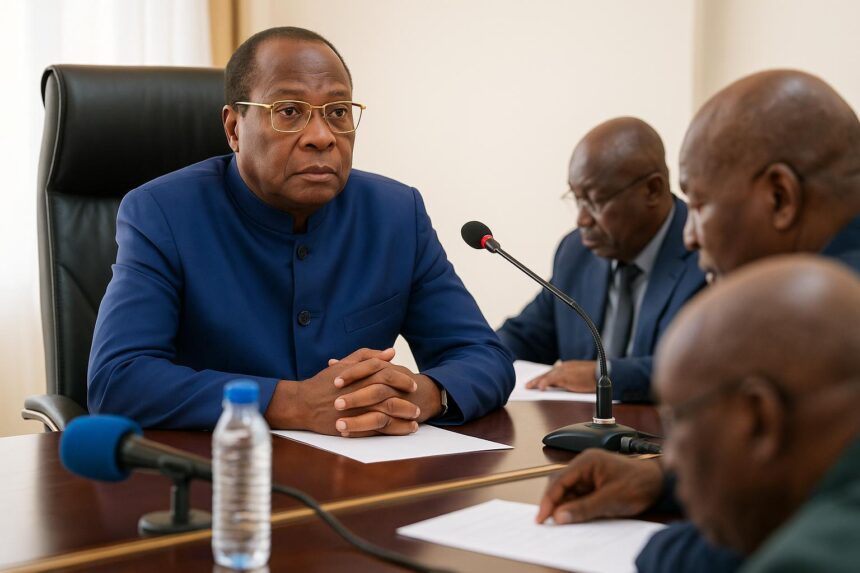Stadium Closure and National Visibility
Three years after national stadiums last hosted domestic league football, Congo-Brazzaville still maintains a cautious prohibition on their regular use. The policy, initially conceived as a temporary safety measure, now intersects with broader considerations of infrastructure stewardship, legal clarity and the country’s forward-looking diplomatic narrative.
- Stadium Closure and National Visibility
- Legal Instruments Guiding Access
- Soft Power and International Commitments
- Institutional Coordination in Brazzaville
- Economic and Social Dimensions
- Strategic Outlook for 2025–2026 Qualifiers
- Emerging Voices within Fécofoot
- Balancing Sovereignty and Global Expectations
Officials at the Ministry of Sports emphasise that preventive maintenance and cost-effective upgrades must precede any reopening. Meanwhile, the Congolese Football Federation, Fécofoot, underscores previously signed twenty-year occupancy agreements and an October 2016 declaration that accompanied FIFA-funded synthetic turf installations, insisting the contractual framework remains fully valid.
Legal Instruments Guiding Access
The central legal instruments are Service Note 0083 of March 2014 and Declaration 861 of October 2016, both recognising Fécofoot’s right to organise competitions in Brazzaville, Pointe-Noire and Dolisie. Lawyers note that these texts carry the force of administrative contract, forming part of the State’s obligations.
An interim suspension issued in 2024 by a ministerial chief of staff was later retracted through a Court of Appeal order, restoring Fécofoot’s prerogatives. However, the ministry retains managerial custody of the venues, and its technical audits reportedly identified drainage, lighting and insurance gaps still requiring funding.
Soft Power and International Commitments
With African qualifiers for the 2026 World Cup commencing in November, Brazzaville’s position is under microscopic attention from CAF and FIFA observers. The Red Devils may be compelled to stage ‘home’ fixtures in neighbouring countries, a scenario critics argue could dilute fan engagement and national symbolism.
Diplomats based in Addis Ababa observe that sports infrastructure represents an increasingly visible barometer of governance capacity across Central Africa. Consequently, Congo-Brazzaville’s calibrated handling of its stadium assets may influence perceptions among development partners evaluating multi-sectoral cooperation, including rail modernisation and climate resilience programming scheduled for 2025.
Institutional Coordination in Brazzaville
Inside Brazzaville, inter-institutional coordination has intensified. Weekly technical committees bring together sports engineers, treasury officials and municipal representatives. One participant notes that discussions now revolve around phased reopenings, beginning with limited-capacity events designed to test crowd management protocols aligned with CAF’s updated stadium safety checklist.
Government advisers reiterate that fiscal prudence remains paramount. The 2025 budget law earmarks nearly 3.2 billion CFA francs for stadium rehabilitation, but disbursement is conditioned on tender transparency thresholds championed by the Supreme State Audit. Observers credit the approach with reinforcing accountability while avoiding abrupt financial pressures.
Economic and Social Dimensions
Beyond elite competition, the closed gates ripple through local economies. Informal vendors who once thrived on match days estimate revenue contractions of up to sixty percent, according to a Chamber of Commerce survey released in May. Youth academies likewise report reduced scouting visibility, though training programmes continue off-site.
In sociocultural terms, football remains a unifying force whose communal rituals often mediate regional identities. Anthropologist Marie-Louise Mvoula argues the present hiatus, although temporary, risks attenuating those shared reference points. She nevertheless stresses that a secure and modernised environment could ultimately amplify the sport’s integrative capacity.
Strategic Outlook for 2025–2026 Qualifiers
Prospects for the national team’s preparation appear constructive. Fécofoot has negotiated provisional training access at the military’s Odziba complex, while friendly fixtures against Benin and Rwanda are pencilled for September. Coaches welcome the arrangement, noting the playing group stayed competitively sharp during the recent African Nations Championship.
CAF regulations allow member associations to request neutral venues, and the Congolese side has initiated conversations with Gabonese counterparts about Libreville’s renovated facility. Such contingency planning, analysts say, demonstrates institutional maturity and protects the athletes’ competitive rhythm until domestic infrastructure formally re-opens for international certification.
Emerging Voices within Fécofoot
Within Fécofoot, two new executive nominees, Eudes Eric Mouandhalt and Hyppolite Okondzi Kongolo, await ratification at the next general assembly. Their professional profiles—finance and legal affairs respectively—suggest an emphasis on governance consolidation. Stakeholders anticipate that their inclusion could accelerate dialogue with public authorities and private sponsors.
The federation has also applauded women’s league teams for convening statutory assemblies on schedule. That procedural discipline aligns with FIFA’s forward 2026 development blueprint, potentially unlocking additional grants for female youth programmes. Observers view the gesture as a signal of internal cohesion during a demanding infrastructural transition.
Balancing Sovereignty and Global Expectations
In diplomatic circles, the stadium question exemplifies how sovereign infrastructure decisions now resonate across multilayered governance networks. Brazzaville’s measured pace, though occasionally queried by commentators, is largely interpreted as an exercise in strategic patience designed to safeguard public assets while honouring international sporting obligations.
Looking ahead, a technical status report is expected before year-end, after which the Council of Ministers could endorse a phased reopening calendar. Should that timeline hold, the 2025-2026 season may return to home soil, offering a renewed platform for unity, economic vibrancy and regional sports diplomacy.
Regional sports ministers scheduled to convene in Yaoundé next spring have placed stadium cooperation on the agenda, providing Congo-Brazzaville an additional forum to showcase progress and solicit technical partnerships.






















